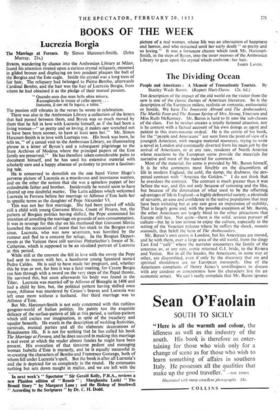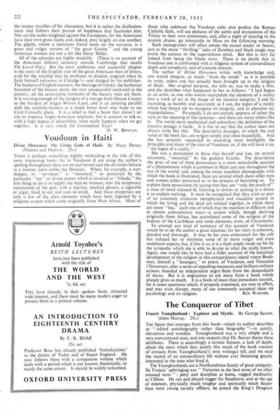The Dividing Ocean
THE description of the impact of the old world on the visitor from the new is one of the classic themes of American literature. So is the description of the European milieu, realistic or romantic, enthusiastic or hostile. We have The Innocents Abroad and The Ambassadors, The Marble Faun and The Roman Spring of Mrs. Strong, Emerson and Miss Ruth McKenney. Mr. Baron is hard to fit into the sub-classes of the class. For he neither creates a totally fictional situation, nor is he content with a factual account of his own doings as agent and patient in this trans-oceanic ordeal. He is the centre of his book, for the "people and Americans" are seen from the point of view of a youngish American, with meagre material resources, trying to write a novel in London and continually diverted from his main job by the arrival of Americans, or at any rate, residents of North America whose reactions to the European scene provide the materials for narrative and most of the material for comment.
Most of the material, for some is provided by Mr. Baron himself. It is he who comments most forcibly on the discomforts of life in modern England, the cold, the damp, the drabness, the per- petual contrast with "America the Golden." I do not think that he overdoes the contrast. The contrast is much greater than it was before the war, and this not only because of rationing and the like, but because of the diminution of what used to be the offsetting advantages of life in England—a highly deferential society, a plenitude of servants, an ease and confidence in the native population that may have been irritating but at any rate gave an impression of stability. That is largely gone and, with the possible exception of Mr. Baron, the other Americans are largely blind to the other attractions that Europe still has. Not quite—there is the solid, serious pursuer of culture—but he is too serious to enjoy the culture, especially in the setting of the Venetian palazzo where he suffers the shock, mutatis mutandis, that befell the hero of The Ambassadors.
Mr. Baron's own centre is London, but his Americans are moved, and he with them, over a large area of the old world, from the dingy East End "café" where the narrator encounters the family of the amorous or, at any rate, erotic returned G.I. bride, to the Riviera and Venice. But in all the locales, the Americans, in some way or other, are discomfited, even if only by the discovery that sin and spiritual shoddiness are no European monopoly. One of the Americans complains of Henry James's unwillingness to discuss with any candour or concreteness how his characters live (in an economic sense). We can 't really complain that Mr. Baron ignores the money troubles of his characters, but it is rather the disillusion- ment that follows their pursuit of happiness that fascinates him. Nor are the scales weighted against the Europeans, for the Americans have their own gross faults and, indeed, prey largely on one another. The gigolo, whom a malicious friend lands on the narrator, is a gross and vulgar version of "the great Gatsby" and the young American women are not a bit like Daisy Miller.
All of the episodes are highly readable. (There is an account of the American military cemetery outside Cambridge that recalls The Loved One.) But the most ambitious and successful chapter is the story of the English 'isit of the great American man of letters, avid for the worship that he professes to disdain, angered when he finds himself unknown in Claridge 's—and dodged by his publisher. The badness of English manners, the shortage of whisky, the barbarian boredoni of the literary party, the very unsuccessful week-end in the country, all the serio-comic torments of the literary man are there. It is warning enough of the dangers of a voyage from Hecate County to the borders of Angus Wilson Land, and is an amusing parallel with the celebrity-hunters at a much lower level who hope to see Cyril Connolly plain. It is a relief to find a book that doesn't set out to improve Anglo-American relations, but is content to tell, us, with a high degree of plausibility, what really happens when we get together. It is very timely for Coronation Year!
D. W. BROGAN.



































 Previous page
Previous page